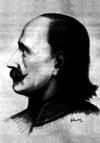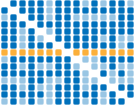The page of Fazekas Mihály, English biography
Biography
Born January 6, 1766 in Debrecen; died February 23, 1828 in Debrecen. Poet, botanist. Descendant of well-to-do family originally of aristocracy; father was a bonesetter and veterinarian. Attended Debreceni Református Kollégium till 1782. Average student but showed ability in literature and botany. Much affected by ten-year friendship with János Földi, whom he considered his master in poetry and botany. Left school and became hussar. Soldier for 14 years (second lieutenant after eight years, first lieutenant in 1796). Served seven years in Galicia. Participated in campaigns against Turks and French. Traveled in Belgium, southern Holland, and western Germany. Resigned commission at end of 1796 and returned to Debrecen. Never married. Learned men of the town, including Mihály Csokonai Vitéz (q.v.), visited him frequently. Increased his participation in community affairs in 1804. Worked to rebuild Nagy Templom, a Protestant church destroyed by 1802 fire. Sent manuscript of Ludas Matyi to Ferenc Kazinczy (q.v.) for criticism in 1804. Opposed Kazinczy in Arcadia dispute in 1806. Became town treasurer, member of several organizations, and captain of civil guard. Helped to establish botanical garden in Debrecen. Lived by farming, did not consider writing poetry main occupation. Wrote some lyric poems between 1804 and 1819. Reworked and enlarged Ludas Matyi in 1814, which was published in 1815 without his knowledge. Founded, edited, and wrote most of Debreceni Magyar Kalendárium until his death. Died of consumption. ¶ Early poems have rococo quality. Ludas Matyi is of lasting interest; historically, it is first literary work to use the techniques, instruments and tone of the folktale successfully and to place peasant (in character of Döbrögi) above nobleman in Hungarian literature. An essential predecessor of the revolutionary and populist tendencies of Petőfi (q.v.). With Sámuel Diószegi he prepared Magyar füvész könyv, first book on Hungarian botany and based on Linnaeus. ¶ Ludas Matyi has been translated into Chinese, Czech, German, Rumanian, Russian, and Slovakian, and some of his verses into Bulgarian, French, and German.(Hungarian Authors. A Bibliographical Handbook by Albert Tezla)




